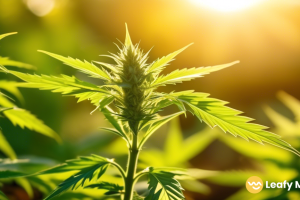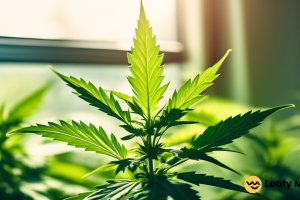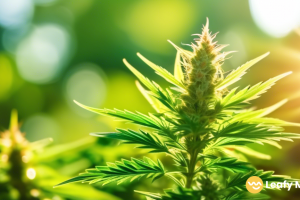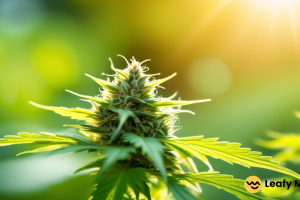Have you ever wondered why cannabis smells the way it does? The answer lies in the presence of compounds known as terpenes. But what are terpenes?
Terpenes, also known as terpenoids or isoprenoids, are the largest group of naturally occurring compounds in the cannabis plant. Terpenes are classified as monoterpenes, sesquiterpenes, diterpenes, and triterpenes. These aromatic hydrocarbon molecules give cannabis its unique smell, taste, and sometimes color. Terpenes are found in many varieties of plants, flowers, trees, fruits, and even some animals. Terpenes can be extracted from botanical sources as essential oils.
Cannabis terpene profiles, or the cannabis plant’s signature terpene makeup, can vary depending on the environment in which they are grown. This results in some cannabis strains having more of one terpene content than others. More than 100 terpenes have been identified in cannabis sativa. The euphoria experienced when cannabis is consumed is a result of the terpenes combined with the plant’s cannabinoids. Some terpenes produce piney or citrusy aromas, while others produce lavender or cinnamon-like scents. The scent of each strain comes from the specific mix of the cannabis sativa plants chemical compounds.
 Aromatherapy is something long associated with terpenes, and a big part of cannabis enjoyment comes from its aroma. Whether it is a sweet fruity smell, a musky spicy scent, or a deep skunky fragrance that hangs around for a while, just smelling cannabis can elicit a response in the body. Taste is a big part of the experience, regardless of the method cannabis is consumed, terpenes are integral to the overall experience.
Exploring Terpenes
Cannabis consumers exploring terpene composition should exercise their due diligence. Cannabis flower and derivative labeling should be read carefully. Most accredited testing labs include terpene profiles for the three most prevalent terpenes and concentrations in excess of two percent.
As volatile organic compounds, terpene concentration will degrade over time. Recent packaging dates should be sought out. Instead of labeling, inspecting the aroma of cannabis flowers is an effective method to determine quality. Diminished fragrance can indicate staleness. Many cannabis oil-based derivatives often feature synthetic terpenes. These synthetics are frequently used in the production of aromatic household cleaners and solvents. Extreme heat should be avoided when consuming these synthetics, as they can produce harmful byproducts.
Aromatherapy is something long associated with terpenes, and a big part of cannabis enjoyment comes from its aroma. Whether it is a sweet fruity smell, a musky spicy scent, or a deep skunky fragrance that hangs around for a while, just smelling cannabis can elicit a response in the body. Taste is a big part of the experience, regardless of the method cannabis is consumed, terpenes are integral to the overall experience.
Exploring Terpenes
Cannabis consumers exploring terpene composition should exercise their due diligence. Cannabis flower and derivative labeling should be read carefully. Most accredited testing labs include terpene profiles for the three most prevalent terpenes and concentrations in excess of two percent.
As volatile organic compounds, terpene concentration will degrade over time. Recent packaging dates should be sought out. Instead of labeling, inspecting the aroma of cannabis flowers is an effective method to determine quality. Diminished fragrance can indicate staleness. Many cannabis oil-based derivatives often feature synthetic terpenes. These synthetics are frequently used in the production of aromatic household cleaners and solvents. Extreme heat should be avoided when consuming these synthetics, as they can produce harmful byproducts.

Where Do Terpenes Come From?
Terpenes are thought to have evolved over time and serve as both natural defense mechanisms and offensive weapons in plants. They can produce overwhelming smells and tastes that discourage predators from consuming them. These smells and tastes also attract potential pollinators. The cannabis plant will also produce terpenes to protect them from the destructive impact of harsh weather. Terpenes are secreted from the plant’s resin glands and broadcast their aroma. These volatile organic compounds, or VOCs, are believed to contribute to the plant’s ability to synthesize oxygen and regenerate. As previously mentioned terpenes can be found in other plants besides cannabis, and are used in a plethora of products we use every day. Some like beta-caryophyllene for example, are found in vegetables and herbs. Beta-caryophyllene has been shown to have some beneficial effects as an anti-inflammatory and remedy for pain. Humulene is very prevalent in hops, one of the main ingredients in beer, as well as in spices like ginger. Terpenes are found in perfumes, foods, lotions, soaps, and more. The smells we love from plants like lavender, rosemary, peppermint, and pine all come from terpenes.Cannabinoids vs. Terpenes
Cannabinoids and terpenes are both active chemical compounds found in cannabis plants. While cannabinoids are considered largely responsible for the euphoric effects and medicinal benefits associated with cannabis sativa, terpenes remain the source of the cannabis plant’s aroma and taste. However, when cannabinoids and terpenes combine, they create a synergistic effect on the human endocannabinoid system. The two complement one another and enhance the sum of their therapeutic or euphoric properties.The Medical Benefits of Terpenes
While cannabinoids like THC and CBD have been studied extensively for their medicinal properties, terpenes have been largely ignored. However, recent studies have begun to reveal the promising benefits of terpenes. Terpenes have shown antibacterial, antiviral, anti-fungal, anti-inflammatory, anti-cancer, anti-anxiety, antiseptic, and antiplasmodial effects. Monoterpenes, such as THC, are the major components in cannabis that are responsible for its many medicinal benefits.How Do Terpenes Make You Feel? Do Terpenes Get You High?
Terpenes alone do not produce the traditional euphoria associated with cannabis consumption. However, some are considered psychoactive due to their effect on the brain. This is because they act on our brains more efficiently than cannabinoids alone might. They amplify the effects of cannabinoids, like THC and CBD, producing an enhanced outcome. Some terpenes contribute to the relaxed feeling produced by certain strains, while others enhance energy and focus. Terpene composition can vary wildly, and only an accredited cannabis testing lab can identify a precise terpene profile.How Do Different Cannabis Terpenes Affect the Body?
Common Cannabis Terpenes and Their Effects
The most common cannabis terpenes are Pinene, Myrcene, Limonene, Linalool, and Caryophyllene.- Pinene is very active in cannabis, and has antibiotic qualities, anti-inflammatory effects, and is being researched for its effects on those with cancer.
- Limonene is thought to enhance cannabinoid ability to provide more energy.
- Linalool is mildly psychoactive and creates a soothing effect helpful in lowering heart rate and blood pressure.
- Myrcene produces a musky aroma that aids in muscle relaxation.
- Caryophyllene is found in cannabis as well as many other plants like basil, oregano, black pepper, and more. It tends to make cannabis strains taste spicy, with a musky scent. It has been researched for pain-relieving properties, as well as an option to help those with addiction.
Which Terpenes are Good for Anxiety?
Terpenes identified as an effective remedy for anxiety:- Myrcene: This terpene, also found in hops and gives beer its bitter taste, aids in anxiety relief.
- Caryophyllene: A terpene found in many plants such as cloves, black pepper, and hops, demonstrated significant anxiolytic activity without the adverse effects commonly associated with pharmaceutical treatments.
- Limonene: A powerful terpene antidepressant that has been shown to alleviate symptoms of depression, stress, and anxiety. Studies have found that limonene can reduce symptoms of stress by more than 50% in less than an hour after consumption.
Which Terpenes are Good for Pain?
Terpenes identified as an effective remedy for pain:- Linalool: A lavender-scented terpene shown to reduce pain. It inhibits the activity of voltage-gated sodium channels in sensory neurons, leading to reduced sensitivity to pain stimuli and other sensory inputs. Linalool’s analgesic properties serve as anti-inflammatory agents.
- Pinene: A powerful terpene that helps reduce the production and release of pro-inflammatory cytokines, which can be linked to chronic inflammation and chronic pain. Some studies have shown that pinene is an effective alternative to opioid-based pain treatment.
- Mood-altering qualities as an antidepressant.
- Pain relief and management.
- Antiviral properties.
- Uses in the fight against cancer.
- Neuroprotective properties
- Antioxidant qualities.
- Allergy management.
- Assisting with insomnia and other sleep issues.
 Aromatherapy is something long associated with terpenes, and a big part of cannabis enjoyment comes from its aroma. Whether it is a sweet fruity smell, a musky spicy scent, or a deep skunky fragrance that hangs around for a while, just smelling cannabis can elicit a response in the body. Taste is a big part of the experience, regardless of the method cannabis is consumed, terpenes are integral to the overall experience.
Exploring Terpenes
Cannabis consumers exploring terpene composition should exercise their due diligence. Cannabis flower and derivative labeling should be read carefully. Most accredited testing labs include terpene profiles for the three most prevalent terpenes and concentrations in excess of two percent.
As volatile organic compounds, terpene concentration will degrade over time. Recent packaging dates should be sought out. Instead of labeling, inspecting the aroma of cannabis flowers is an effective method to determine quality. Diminished fragrance can indicate staleness. Many cannabis oil-based derivatives often feature synthetic terpenes. These synthetics are frequently used in the production of aromatic household cleaners and solvents. Extreme heat should be avoided when consuming these synthetics, as they can produce harmful byproducts.
Aromatherapy is something long associated with terpenes, and a big part of cannabis enjoyment comes from its aroma. Whether it is a sweet fruity smell, a musky spicy scent, or a deep skunky fragrance that hangs around for a while, just smelling cannabis can elicit a response in the body. Taste is a big part of the experience, regardless of the method cannabis is consumed, terpenes are integral to the overall experience.
Exploring Terpenes
Cannabis consumers exploring terpene composition should exercise their due diligence. Cannabis flower and derivative labeling should be read carefully. Most accredited testing labs include terpene profiles for the three most prevalent terpenes and concentrations in excess of two percent.
As volatile organic compounds, terpene concentration will degrade over time. Recent packaging dates should be sought out. Instead of labeling, inspecting the aroma of cannabis flowers is an effective method to determine quality. Diminished fragrance can indicate staleness. Many cannabis oil-based derivatives often feature synthetic terpenes. These synthetics are frequently used in the production of aromatic household cleaners and solvents. Extreme heat should be avoided when consuming these synthetics, as they can produce harmful byproducts.











Leave a Reply